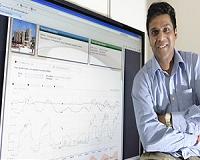 |
Washington DC (SPX) Jul 02, 2010 The American Physical Society, a leading organization of physicists, presses congressional leaders to increase research investments for future energy technologies that will strengthen energy security and reduce the likelihood of disastrous effects associated with fossil fuel exploration as evidenced by the BP oil spill. The Gulf oil spill - the worst in the history of the nation - has caused extraordinary environmental and economic damage to the communities along the Gulf Coast. Out-of-work fishermen are wondering how they will provide for their families; oil-drenched birds are struggling to live; and globs of oil are washing ashore on area beaches causing tourists to look elsewhere for vacation. Current technologies exist to begin the job of achieving true security. But to dramatically reduce the nation's reliance on foreign oil and domestic drilling and to meet the nation's 2030 target to substantially reduce greenhouse gases, advanced technologies are needed. And that means a greater investment in long-term research. The U.S. House cap-and-trade (Waxman-Markey) bill shortchanged that kind of research. The Senate must do better. Legislators should start by including in the bill the president's Clean Energy Technology Fund, an investment of $15 billion per year over 10 years to develop affordable, low-emission energy technologies. Energy efficiency, an APS Study Panel concluded, is the easiest and least inexpensive way to significantly reduce the nation's demand for imported and domestic oil and its greenhouse gas emissions without causing any loss of comfort or convenience. "Energy efficiency reduces demand, and energy we do not use costs nothing, emits nothing and does not pollute the Gulf," said Nobel Laureate Burton Richter, who chaired the APS energy efficiency study and authored the newly released book, "Beyond Smoke and Mirrors: Climate Change and Energy in the 21st Century." Numerous technologies already exist to increase the efficiency of U.S. vehicles and buildings that will save consumers money. But, as the panel's report, Energy Future: Think Efficiency noted, realizing future gains, as with other energy technologies, will require a larger and better focused federal research and development program on energy efficiency than exists today. The APS report also noted that consumers often are not provided with information that allows them to make informed decisions on energy consumption. The cap-and-trade legislation should include a provision to help consumers save money by requiring energy audits at the point of sale for new homes. The audits would give home buyers valuable information regarding energy efficiency upgrades to lower their utility costs.
Share This Article With Planet Earth
Related Links American Physical Society Powering The World in the 21st Century at Energy-Daily.com
 Enterprise PCs Work While They Sleep, Saving Energy And Money
Enterprise PCs Work While They Sleep, Saving Energy And MoneySan Diego CA (SPX) Jun 25, 2010 Personal computers in enterprise environments save energy and money by "sleep-working," thanks to new software called SleepServer created by computer scientists from the University of California, San Diego. Sleep-working enterprise PCs are accessible via remote connections and maintain their presence on voice over IP, instant messaging, and peer-to-peer networks even though the PCs are in ... read more |
|
| The content herein, unless otherwise known to be public domain, are Copyright 1995-2010 - SpaceDaily. AFP and UPI Wire Stories are copyright Agence France-Presse and United Press International. ESA Portal Reports are copyright European Space Agency. All NASA sourced material is public domain. Additional copyrights may apply in whole or part to other bona fide parties. Advertising does not imply endorsement,agreement or approval of any opinions, statements or information provided by SpaceDaily on any Web page published or hosted by SpaceDaily. Privacy Statement |